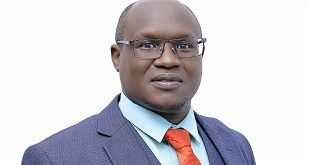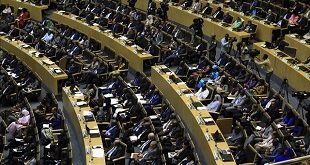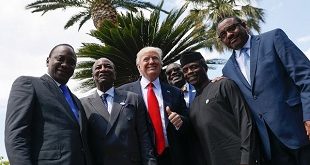
By Mubatsi Asinja Habati
An inside look at thetop positions in most government bodies
While opening the National Resistance Movement (NRM) party National Executive Council meeting at State House Entebbe on January 12, President Yoweri Museveni warned delegates that his government will not tolerate anybody propagating and practising sectarianism.

‘We defeated this (sectarianism) opportunism in the Luwero Triangle; that is why Uganda has had these 24 years of stability. We are not going to tolerate opportunism in the wider society of Uganda. It is incumbent on everybody to promote patriotism,’ the President said.
But in the afternoon, when delegates were reacting to his speech, a delegate from Adjuman, Angela Kebba, put the president on the spot. As other delegates cheered her, she asked Museveni why most people holding key government positions are from western Uganda and are closely related to him and yet he claims to be against sectarianism. Sectarianism refers to all forms of religious, ethnic or gender chauvinism. President Museveni’s wife, his younger brother, his son, daughters, in-laws hold top government positions.
Museveni laboured to explain that people from his ethnic group are dominant because of their individual contribution to the struggle that brought him to power in 1986. He said he bases appointments on the individual’s contribution to the NRA liberation struggle and their vote popularity. This is not the first time that Museveni was being confronted directly about alleged sectarianism in his appointments. During an NRM Parliamentary Caucus meeting in 2007, the NRM Vice Chairman for Eastern region, Mike Mukula told Museveni that his perceived sectarian tendencies were hurting the nation. The opposition jumped on it and MPs, Hussein Kyanjo (Makindye West) and Erias Lukwago (Kampala Central) demanded that the government reviews the national appointment policy as apart of wider efforts to curb sectarianism. Nothing has been done.
Museveni constantly speaks against sectarianism. However, people in and outside his party, appear unsatisfied. This is partly because, apart from speaking out against it, he has done nothing to correct obvious acts of sectarianism. In fact, many times people who have complained about sectarianism have ended up being punished instead.
In a significant incident late last year, the Education Ministry’s permanent secretary, Francis Lubanga, was accused of dismissing some employees at the ministry replacing them with his relatives. A whistleblower, in a 14-page dossier to the President, claims 30 people related to Lubanga have been employed in the key positions in the ministry. They include his wife, son, sister, uncle, nephew, in-laws. Many of these are said to have been irregularly hired, promoted or put in charge of the ministry’s projects worth millions of shillings. Lubanga said his relatives are employed because they are qualified. Nothing has been done about this case.

Contrary to what they claim to be the education policies and practices, the whistleblower alleges that Lubanga’s wife was irregularly promoted from a mere classroom teacher to headmistress of Kyambogo College School while still on probation.
Lubanga’s case is typical of what is going on in many government agencies. A survey by The Independent that looked at 20 government bodies revealed that most parastatals are dominated by people from one ethnic group. In most of the agencies if the head comes from a particular ethnicity, chances become high to have key departments in the parastatal headed by people from the head’s home area or ethnicity.
Bank of Uganda, for example, has eight of the 10 top-most bosses from the same corner of the country.
At the Uganda Bureau of Statistics all six key departments except that of Director of Business Industrial Statistics are headed by people who speak the same language as the bureau’s chief executive. And contrary to popular misconception, some ethnic cliques are not from western Uganda.
Most are qualified for the job but accusations of nepotism abound. Often one question is asked: do other areas not have people who are qualified to do the same work? The issue has sparked hot debates.

Prof. Edward Kakonge, chairman of Uganda Debt Network, says the public institutions should reflect what Uganda is. He says the leadership has failed this test and institutions are turning into some sorts of ethnic camps. Kakonge says he does not think even State House which is supposed to be a symbol of the nation can pass highly this test.
But Dr Narathius Asingwire, head of the Social Work and Social Development department at Makerere University, says there is no problem employing people from one ethnic group – provided they are qualified and competent.
‘Public institutions should reflect Uganda as a whole other than reflecting some ethnic groups as we see,’ says Prof. Kakonge, ‘It is not only for these parastatal bodies; it is a practice you find everywhere. You go for example to State House, does it reflect this nation? You can find that the bigger proportion of workers is from a certain part of the country. What message are you sending to Ugandans? ‘
Three years after it captured power in 1989, Museveni’s government enacted the anti-sectarian law.
Under the Penal Code Act Section 41, promoting sectarianism refers to (1) A person who prints, publishes, makes or utters any statement or does any act which is likely to ” (a) degrade, revile or expose to hatred or contempt; (b) create alienation or despondency of; (c) raise discontent or disaffection among; or (d) promote, in any other way, feelings of ill will or hostility among or against, any group or body of persons on account of religion, tribe or ethnic or regional origin commits an offence and is liable on conviction to imprisonment for a term not exceeding five years.
The same section adds in (2) that it shall be a defence to a charge under subsection (1) if the statement was printed, published, made or uttered, or the act was done with a view to exposing, discouraging or eliminating matters which promote or have a tendency to promote sectarianism.
However, the law which was framed to promote a level playing for all tribes and religions appears to be used mainly to gag those who criticize sectarian tendencies, especially journalists. Most of these write about sectarianism with a view of eliminating it. Charging them in courts of law, therefore, amounts to promoting it by attempting to silence debate on the issue.
Among those who have been either quizzed by police or charged are: Andrew Mwenda, Managing Editor The Independent magazine, James Tumusiime; the Managing Editor The Observer newspaper, Ssemujju Ibrahim Nganda, the Political Editor The Observer newspaper, a Luwero farmer David Ntege, Beti Kamya; MP Lubaga North, Hussein Kyanjo; MP Makindye West, Issa Kikungwe; MP Kyadondo South, Betty Nambooze Bakireke; DP Spokesperson, Meddie Nsereko of CBS Radio, David Mpanga, Buganda’s Research Minister and Daudi Ziwa.
At the height of the so-called Buganda riots last year, the government forcibly shutdown four radio stations allegedly for promoting sectarianism.
Impact of sectarianism
In his book titled, Ethnicity, State Power and Democratisation Process in Uganda, Dr Juma Okuku, a political scientist and senior lecturer at Makerere University, argues that the implementation of Structural Adjustment Programmes in Uganda led to reforms in the civil service which led to creation of new specialized agencies like URA, Civil Aviation Authority, Privatization Unit, UIA, etc. He says: ‘The negative side to the creation of these organizations was that the NRM saw it as an opportunity to reward its political and ethnic clients from the south-western part of the country with jobs. This ethnically based recruitment has raised concern,’ Okuku states in his book. The answer to these complaints about the alleged preferential treatment within government bodies; be it in the army has been that those from the western region were more educated and contributed a lot to the NRA struggle. But one wonders whether after two decades of liberation this argument still holds.
Prof. Kakonge says the implication of the ethnic camps in most public institutions is manifested in how deep corruption has sunk into society and how remorseless it has left people. He says this slows down service delivery. This results in marginalisation of certain areas and people. Women, for example, are not well represented in top government bodies at management and decision making levels. Where does this leave the issue of women empowerment?
‘Even if government had good intentions of developing a certain area, development does not take place for a simple reason that you don’t have dedicated civil servants to do a good job for Uganda,’ says Kakonge.
In some organizations the top departmental managers may be from different regions and tribe but a big number of workers under them are of the same ethnicity as the CEO. Having department managers from different regions may be meant to make it appear as if there is regional balance in administration of the government body; possibly to diffuse sentiments that the public may have about employing same ethnic groups in the organization.
MP Reagan Okumu, who chairs the Parliamentary Committee on Commissions, Statutory Authorities and State Enterprises, says it is a bad signal to the country arguing that when you talk of distribution of resources it also applies to employment. ‘Even employment should be equally distributed because no region has a monopoly over administration,’ he said. He says the practice is extremely unfair and adds that it is being reflected in the army where we have top army commanders coming from the same area or village.
Asingwire says there should be concern if people get the job because they have a ‘godfather’ in the work place.
‘When you come into the organization through the backdoor, you will tend not to be conscious of how you are performing because you will think all the time you are protected. In a way you are not answerable to the organization. And people who are recruited like that normally do not have the competences though they may have qualifications. And professionally they leave a lot to be desired that is why you find much abuse of office today.’
Way forward
Kakonge says hope to change this situation should be put in the youths. He says the youths have a bigger stake in this country than the old generation and thus they should be ‘given opportunity to shape the Uganda we want’. But Kakonge is skeptical that total transformation of this attitude may come easily because ‘the youths are part of the corrupt society and many of them are marginalized and used as political tools’. He says the government should open more opportunities to the young generation to prepare a better Uganda. But Okumu says it is only political change that can solve this. The experience of the Uganda Revenue Authority (URA) shows that accountability is a factor in curbing sectarianism. For a long time, URA had been accused of employing people from only one tribe. However, the Commissioner General Allen Kagina produced a list of top employees of the organisation. Although the accusations persist, it is clear from the gesture that the organisation is sensitive to the claims.
Top officials in some of the key government bodies
Bank of Uganda:
Prof. Emmanuel Tumusiime Mutebile-Governor
Patrick Byabakama ‘Kaberenge-Ag. Deputy Governor
Johnson Mubangizi – Executive Director-Administration
Mr. Patrick Kagoro-Executive Director, Finance
Mrs. Justine Bagyenda-Executive Director, Supervision
Mr. Elias Kasozi-Executive Director, Operations
Dr. David Kihangire-Ag. Executive Director, Research
Mr. George Nyeko-Bank Secretary
Ms. Deborah Kabahweza-Ag. Chief Internal Auditor
Dr. Polycarp Musinguzi-Executive Director, Gen. Duties
Dr. Martin Brownbridge -Economic Advisor to Governor
National Planning Authority
Kisamba Mugerwa ‘Chairman Board
Tasasirano Longino ‘Executive Director
Francis Ojek ‘Human resource Development
Public Procurement and Disposal of Public Assets:
James Kahoza ‘Chairman Board
Edgar Agaba ‘Executive Director
Joshua Mulera ‘Director Procurement, Audit and Investigation
Benson Turamye ‘Manager
Mary Sozi ‘Director Finance and administration
Fionah Kanyike ‘Manager
Asaph Mugisha ‘Human Resource Manager
Etiang Joseph ‘ Internal Audit manager
Conelia Kakooza Sabiiti ‘Legal Compliance director
Milton Tumutegyereize ‘ Director training and capacity building
Uganda Bureau of Statistics,
J.B Male Mukasa -Executive Director
James Mubiru -Deputy Executive Director
Johnson Kagugube -Director Statistics/ Capacity
Andrew Mukulu -Director Population & Social Statistics
Seth Mayinga -Director Business industrial statistics
Mathew Sewanyana -Director Macroeconomic policy)
National Agricultural Advisory Services
David Kantaale Kazungu -Board chairman
Dr Silim Nahdy ‘Executive Director
Francis Byekwaso -Deputy Executive Director, Planning and Monitoring manager
Andrew Kilama ‘Finance and Administration manager
Joseph Oriokot ‘Technical Services manager
Uganda Coffee Development Authority
Henry Ngabirano ‘Managing Director
Julius Madira -Principal Monitoring and Evaluation officer
Fred Luzinda-Mukasa -Board secretary/head of finance and administration
Michael Wasswa -Principal Administrative officer
Nina Nassuna -Principal accountant
David Kiwanuka -Manager Quality, regulation and information
Cotton Development Organisation
Richard Parwot ‘Chairman Board
Jolly Sabune ‘Managing Director
Apollo N Makubuya ‘Board Secretary
Willy Owachi ‘Finance manager
S.B.K Biraaro ‘Market Monitoring and information manager
- Ntandayarwo ‘Technical manager
Electricity Regulatory Authority
Ben Dramadri ‘Chairman Board
Dr Frank Sebbowa ‘Chief Executive Officer
Patrick Mwesige ‘Director Finance and Administration
Mary Kansiime Mwine.- Human Resource & Admin. Officer
Eng Robert Semitala ‘Director technical regulation
Benon Mutambi ‘Director Economic regulation
Johnson Kwesigabo ‘head legal department
National Water and Sewerage Corporation
Dr William Muhairwe ‘Chief Executive Officer
Walusimbi Irene Sarah -Chief Manager, Manag’t Services
Proscovia Aketch Lubowa -Chief Internal Auditor
Dr. Eng. Silver Mugisha -Chief Manager, Institutional Development & External Services
Alex Gisagara -Chief Manager, Engineering Department
Okiidi Alfred Okot -Chief Manager, Finance & Accounts
Mr. Amayo Johnson -Chief Manager, Planning & Capital Development
Uganda Communications Commission
Patrick Mwesigwa ‘Ag. Executive Director
Hodge Semakula ‘Commission’s Secretary/ Director Legal Affairs
C.M.D. Mutyaba ‘Director human resource and administration
Quinto Ojok ‘Director Finance
John Bantulaki ‘ Ag. Director Technology and licensing
Bob Lyazi ‘Director Rural Communications Development Fund
Uganda National Roads Authority
Eng Peter Ssebanakitta ‘Executive Director
Ben Ssebuga ‘Director Operations
Dan Alinange ‘Spokesperson
Uganda Investment Authority
William Kalema ‘Board chairman
Maggie Kigozi ‘Executive Director
Tom Buringuriza ‘Deputy Executive Director
Issa Mukasa ‘Director Investment promotion
Lawrence Byensi ‘Director Investment Facilitation
Arthur Bwire Tukahirwa ‘Director Industrial Parks Development
Joel Byaruhanga ‘Director Finance and administration
Barnabas Tumwesige ‘Director Lands development division
Uganda Wild Life Authority
Andrew Kasirye ‘Board chairman
Moses Mapesa ‘Executive Director
Eunice Duli ‘Director Tourism Services
Lillian Nsubuga _PRO
National Drug Authority
Dr Frank Mwesigye ‘ Chairman Board
Dr Apollo Muhairwe ‘Executive Secretary
Emmaline Susan Mbabazi ‘Head human resources and administration
David Nahamya ‘In-charge Post Market Surveillance
Mrs Kikule ‘Chief Inspector of Drugs
Helen Ndagije-Byamire ‘Head of Drug Information
Uganda Revenue Authority
Ibrahim Kabanda ‘Board chairman
Allen Kagina ‘Commissioner General
- Kabway-Deputy Commissioner General, Administration
Justin Zake-Deputy Commissioner General, Revenue
Mike Chibita-Executive Assistant to Commissioner General
Magoola Kalyebe-Assistant Commissioner, Modernisation
Sarah Birungi Banage-Assistant Commissioner, Public and Corporate Affairs
National Social Security Fund
Vincent Ssekono ‘board chairman
Martin Bandeebire ‘Ag. Managing Director
Julius Ishungisa – Chief Finance Officer
Barigye Geoffrey – Ag. Chief Internal Auditor
Francis Baryahabwa - Ag. Chief Operations Officer
Grace Isabirye - Chief Investment Officer
George Kyarikunda – Chief Administration Officer
Barigye Geoffrey – Ag. Chief Internal Auditor
Charles K Muhoozi – Chief Marketing and Communications Officer
Peter Kahiigi – Chief Information Systems Officer
Dennis Ochieng – Chief Risk Officer
National Medical Stores
Moses Kamabere ‘General Manager
Edith Kakuba ‘head Finance and accounts
National Environment Management Authority
Aryamanya Mugisha ‘Executive Director
Gerald Musoke Saula ‘deputy executive director
Onesmus Muhwezi -Director Environmental Monitoring and Compliance
Beatrice Adimola -Director, District Support and Public Education
Aristarco Kasekende Mujuzi -Director Finance and Administration
Jolly Kamwesigye ‘Human Resource manager
Telly Eugene Muramira -Dir. Policy, Planning & Information
Inspectorate General of Government
Raphael Baku Ag. IGG
Bageya Waiswa ‘secretary to the IGG
James Penywi ‘director of operations
Elizabeth Musoke ‘Director legal affairs
J.J Rwereza ‘Director of education and prevention of corruption
Muzamil Abor -Director regional offices and follow up
Uganda National Bureau of Standards
Dr Terry Kahuma ‘Executive Director
Dr Ben Manyindo -Deputy Executive Director
Mackay Aomu ‘Deputy Executive Director Manag’t service
Davis Ampwera ‘Finance and administration
Gyavira Musoke ‘Head of imports
Abdul Ndibuna -Head of certification
David Kiragga -Quality manager
Patrick Ssekitoleko ‘Manager Quality Assurance
Population Secretariat
Charles Zirarema ‘Ag. Director
Edith Kangabe ‘Ag. Head Policy and Planning
Dr Betty Kyaddondo ‘Head Family health
Hannington Burunde ‘Head Information and Communication
Andrew Tondi ‘Head Monitoring and Evaluation
Hassan Musinguzi ‘Head Finance and administration
National Enterprise Corporation
Col Fred Mwesigye ‘Managing Director
George Odongo ‘General Manager NEC works
National Forestry Authority
Hudson Andrua ‘Ag. Executive director, Director Natural Forests
Paul Drichi ‘Director Plantations
Ernest Kaddu ‘Director Finance and administration
Paul Buyerah ‘Director Corporate Affairs
 The Independent Uganda: You get the Truth we Pay the Price
The Independent Uganda: You get the Truth we Pay the Price


